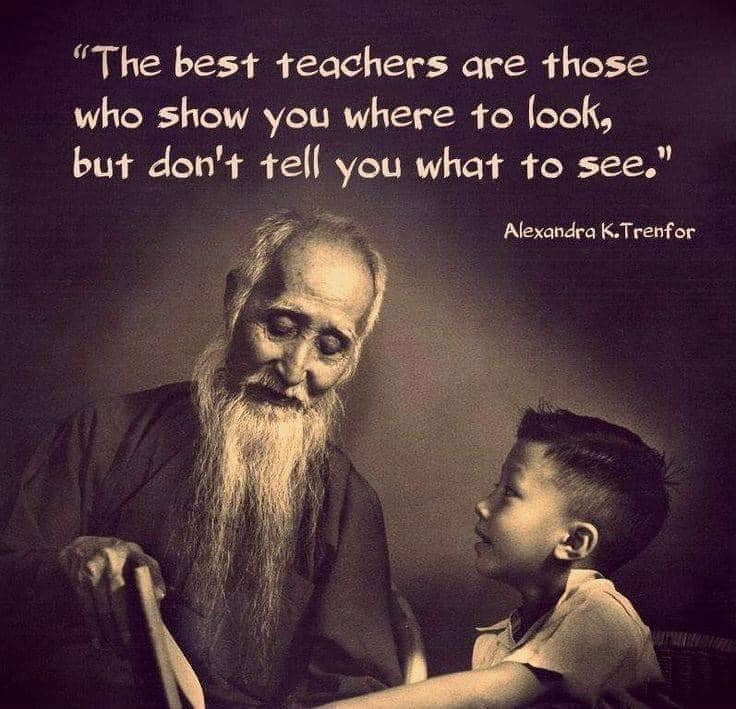
A Facebook friend shared the above meme which features this quotation:
“The best teachers are those who show you where to look, but don’t tell you what to see.”– Alexandra K. Trenfor
I was just going to chime in in response to add “or hear” alongside not telling people what to see when directing them where to look, since the person who shared the quote is a composer and music professor.
But almost immediately in response to the quote, someone complained that their daughter had been subjected to indoctrination against conservative views while studying at university. That led me to respond in a comment, and sowed the seeds of this blog post.
I want to point out that even telling people to look has values woven into it. The whole premise of education as practiced at universities like Butler University is that we should look critically and dare to question things we have been told in our upbringing, whatever they may have been. And while we should not and do not tell students what to see, the truth is that even when there are a range of conclusions that may all be compatible with the evidence so that there is no definitive right answer, that doesn’t mean that all answers are equally compatible with the evidence.
As an example of the kind of critical thinking rather than indoctrination that a university education instills and which some do not appreciate, let me add that no one seems to be able to track down who Alexandra K. Trenfor is or where the quote comes from. People have looked into the question but with no real results. Even the surname Trenfor appears to be a dead end, which is even more mysterious. We live in an era in which sayings are attributed to famous people inauthentically. The internet is full of them. Sayings of less famous people get attached to better-known names to give the words greater authority and help them go viral. The case of Alexandra Trenfor seems to be an exception. She may just have been someone active on social media (then basically just Facebook) in the early days, who had a knack for pithy and insightful sayings but was not famous apart from that. Perhaps this is a pseudonym. Today, someone whose words went as viral as the quotes attributed to Alexandra K. Trenfor have would wish without avail that they could now get their name attached to the words that circulate so widely with no attribution to their source and no accompanying fame or recognition. This seems to be the opposite circumstance, in which someone created some great quotes, some memeworthy sayings, but did not wish to be associated with them. I spent longer than I should have, longer than I could afford the time to, trying to investigate using the skills that I practice and teach as an academic. I didn’t meet with success, but I was motivated to fact-check and not simply circulate something I came across without doing so. Teaching others to do that is “indoctrination” against conservative values only if conservatives are opposed to education itself. The person who complained about “indoctrination” in higher education accused educators of not doing what this mysterious quotes says the best teachers ought to. But that wasn’t really their complaint. The objection is that we teach people to look at and critically evaluate not only views different from those they were brought up to hold, which fellow conservatives would happily see analyzed so as to expose any and all flaws and shortcomings; we also insist that that critical examination be turned inwards at one’s own convictions and assumptions.
The way I used to put it was that I don’t care what students think but how they think. I hesitate to put it that way nowadays simply because, as I said above, not all conclusions are equal. You may disagree intelligently many matters and yet that doesn’t mean that “conspiracy” or “aliens” are on the same footing with the different conclusions that significant numbers of scholars hold and about which they engage in vigorous ongoing debate. Now I tend to say that you are not obliged to change your mind nor should you feel as though you cannot. The key thing is that if you hold the views you were brought up to, they should become your conclusions instead of merely your views or assumptions.
Let me conclude with two other quotations that a colleague posted in the same thread, which express a similar or at least a related sentiment:
“Learning to write is learning to see.”–Simon van Booy
“I don’t know exactly what a prayer is. I do know how to pay attention.”–Mary Oliver
One of the two was misattributed. The attribution above appears to be correct. But as years of study have taught me, and I seek to teach others: I may be wrong. And so I never seek to indoctrinate, but instilling an appreciation for questioning and challenging the assumptions not just of others but of oneself and one’s own tradition is perceived as such by those whose values reject this core conviction that is central to the ethos of what we mean by education itself.













